I’m excited, I’m stoked, my official IIHF credentials arrived via email Thursday for the 2019 World Junior Hockey Championship. So I’ll be in Vancouver, reporting live for THW, from Boxing Day through the gold-medal game on Jan. 5.
Next to playing in this prestigious tournament, attending — and in my case covering — the annual best-on-best showcase has to be on the bucket list for every Canadian millennial who grew up watching the World Juniors, dreaming of wearing the Maple Leaf, and living vicariously through the teenagers turned NHL stars who have shined on this international stage over the past few decades.
TSN’s Top 10 from Wednesday was World Junior moments for Team Canada and that got me all fired up, beyond pumped for what’s to come over the next couple weeks. Jordan Eberle’s dying-seconds equalizer against Russia from the 2009 semifinal topped that list — an unforgettable goal that I fondly remember watching from the Gunbarrel Saloon at Apex Mountain Resort near Penticton — but all those highlights brought back a flood of memories and I can’t wait to be in the building, in Rogers Arena, when new ones are made for 2019.
The other one that really stood out for me from that package was the ‘Double Dion’ from 2005, when Dion Phaneuf flattened two Russians at the Canadian blue line and the top trio of Sidney Crosby, Corey Perry and Patrice Bergeron combined to score in transition. I wasn’t always the biggest fan of Pierre McGuire’s over-the-top commentary — I much prefer Ray Ferraro in the present — but that call will go down in history as an all-timer for both McGuire and Gord Miller. It’s definitely a moment worth reliving.
Now that everyone is on the edge of their seat thanks to that nostalgia, let’s look ahead with a list of 10 things to watch heading into the 2019 tournament.
1) Canada’s Goaltending
Leading off this list with my key to victory for Team Canada, getting stellar and consistent goaltending is going to be crucial to defending gold on home ice.
With some concerns over scoring depth and rostering a younger than usual defence, Canada may need a Justin Pogge or Dustin Tokarski-type performance to repeat. Be it Michael DiPietro or Ian Scott — or some combination of the two as the tournament progresses — goaltending could make or break Canada’s medal hopes in 2019. Tim Hunter knows it and now you do too.
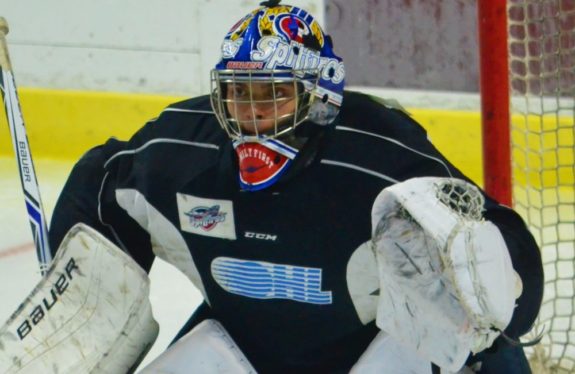
Michael DiPietro of the OHL’s Ottawa 67’s — a Vancouver Canucks prospect and Memorial Cup winner — is the favourite to backstop Canada to start this year’s World Junior Championship.
Goaltending has been hit or miss for Canada in recent years, often times emerging as a weakness for whatever reason — perhaps the pressure becomes too immense under the media spotlight. That can’t be the case this year, and I referenced Pogge and Tokarski rather than Carey Price or even Carter Hart from last year because DiPietro and Scott aren’t household names in the hockey world yet and will have to make a name for themselves in this tournament. This is their chance to shine and Canada needs one or both of them to rise to the occasion.
If the goaltending proves subpar, Canada might not make the podium in 2019 and that would obviously be a huge disappointment as the host nation.
2) Hughes vs. Kakko
The scout in me is most looking forward to this matchup between Jack Hughes and Kaapo Kakko, the consensus top two prospects for the 2019 NHL draft. They have a head-to-head showdown in Victoria on New Year’s Eve and could potentially meet again in the medal round.
Hughes is topping almost all the rankings heading into the tournament — including my top 186 for December — and it’s debatable how close of a challenger Kakko is as of today. However, if Kakko outshines Hughes at the World Juniors — in their head-to-head and their overall showings — then the debate will really heat up for No. 1.
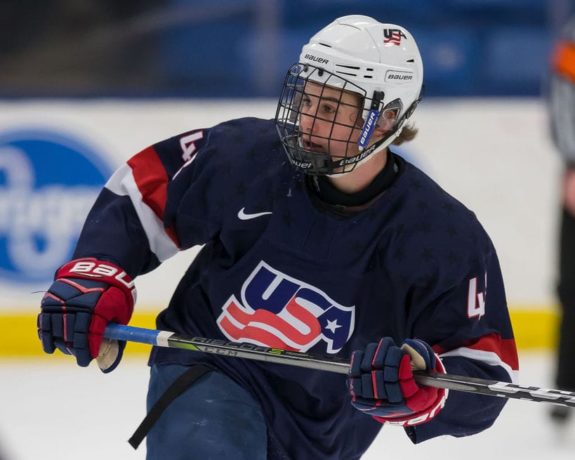
Jack Hughes is as dynamic as he is fast and that combination has made him the favourite to be picked first overall in the 2019 NHL entry draft.
For those not familiar with the two, Hughes is a faster version of Patrick Kane, while Kakko has drawn favourable comparisons to Patrik Laine despite recently shifting from the wing to centre. Regardless, they are both special talents and should go 1-2 in June.
3) Other Draft Eligibles
My projected No. 3 prospect, Russian forward Vasili Podkolzin, is believed to be on the bubble for his national junior team and might be among the final cuts, so there is no guarantee that he’ll be on display.
I’m holding out hope that Podkolzin can crack Russia’s roster since he’s already been a standout for his country at both the Hlinka Gretzky Cup in August and the World Junior A Challenge earlier this month. But Podkolzin is a big maybe at this point and the betting odds are probably against him since Russian coach Valeri Bragin rarely brings draft-eligible players to battle in this tournament.
Canada doesn’t have any draft eligibles — aside from undrafted double-overager Brett Leason — and the United States will only be showcasing Hughes and possibly goaltender Spencer Knight.
Sweden and Finland may have more draft eligibles, but they both have cuts to come as well. For the Swedes, slick-skating defenceman Philip Broberg — another standout from the Hlinka — and crafty winger Nils Hoglander are still competing for roster spots, while the Finns will be young on the back end with four draft eligibles in Mikko Kokkonen, Antonni Honka, Ville Heinola and Lassi Thomson all in the mix and all ranked as first-rounders for me ahead of this tournament. At least a couple of them will likely be in Finland’s lineup.
2019 NHL Draft: @LarryFisher_KDC Top 186 for December https://t.co/TQ3LE7FJTq #THW #NHLDraft #NHL pic.twitter.com/gBea5tVsfy
— The Hockey Writers (@TheHockeyWriter) December 18, 2018
Slovakia has Maxim Cajkovic and Switzerland has Valentin Nussbaumer as potential first-round forwards — both are ranked as second-rounders for me right now — while Denmark goaltender Mads Søgaard has been climbing the rankings as an import for the WHL’s Medicine Hat Tigers.
Michal Teply didn’t make the cut for the Czechs, but Martin Has, Vojtech Strondala and Petr Cajka are still auditioning for that team as far as I know.
Swiss forward Kyen Sopa and Slovak defender Oliver Turan are also intriguing prospects that could improve their draft stock should they stick on their respective rosters.
Kazakhstan, as the great unknown of this year’s tournament, could have a few draft eligibles of interest too, including forward Maxim Musorov and defenceman David Muratov.
4) Underagers, Lafrenière and Lundell
These two forwards — Alexis Lafrenière of Canada and Anton Lundell of Finland — could be top-five picks for the 2020 draft and will look to get a head start on impressing the NHL scouts at this year’s World Juniors. Many already have Lafrenière as No. 1 for 2020, so he’ll have to live up to that hype.
In saying that, they are only 17 years old and this tournament is typically dominated by 19 year olds, so temper your expectations for Lafrenière and Lundell. They may not play prominent roles, at least not from the outset, but they have elite talent and could make an impact as the tournament progresses.
Definitely two youngsters to keep a close eye on for the future and they’ll be easy to spot since both will be wearing full cages due to their late-2001 birthdates.
There might be a couple other 2020 eligible prospects playing in the 2019 World Juniors, but Lafrenière and Lundell are the big names of note.
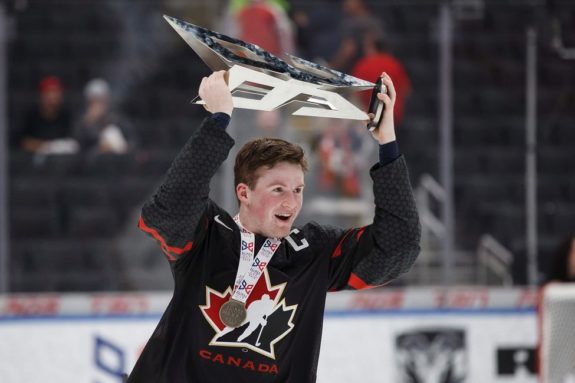
Canada’s Alexis Lafreniere hoists the Hlinka Gretzky Cup following the gold-medal game against Sweden in Edmonton on Aug. 11, 2018.
5) Pro Players on Loan
Canada didn’t get any reinforcements this year. Robert Thomas (St. Louis) and Michael Rasmussen (Detroit) stuck in the NHL and Gabe Vilardi (Los Angeles) wasn’t ready to return from a nagging back injury. Max Comtois (Anaheim), Owen Tippett (Florida), Jaret Anderson-Dolan (Los Angeles) and Evan Bouchard (Edmonton) do have NHL regular-season experience but were all returned to junior earlier this season. Alex Formenton (Ottawa) was removed from that list when a knee injury took him out of this year’s tournament and made Comtois the lone returnee for Canada from last year’s gold medal-winning team.
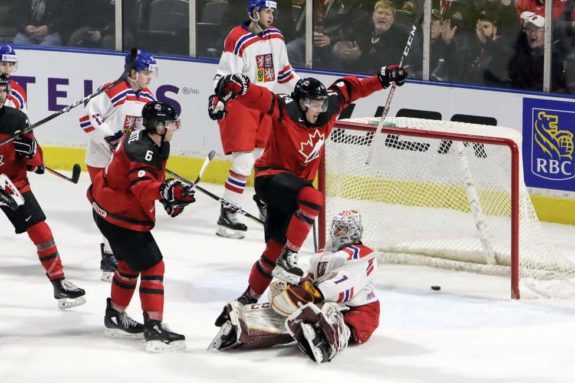
Canada’s Max Comtois (14) celebrates scoring a goal on Jakub Skarek (1) of the Czech Republic during last year’s World Junior Championship.
The Americans are in the same boat, with no help coming from the pro ranks and no NHL regular-season experience on their roster. It is a relatively young Team USA, with at least a few 2018 first-rounders in key roles, but there is enough skill throughout that lineup to contend for a medal again.
Finland will be bolstered by defencemen Henri Jokiharju (Chicago) and Urho Vaakanainen (Boston) as well as scoring winger Eeli Tolvanen (Nashville), while power winger Kristian Vesalainen (Winnipeg) strangely declined the invitation to represent his country. No matter, those three ringers will make the Finns a legit threat.
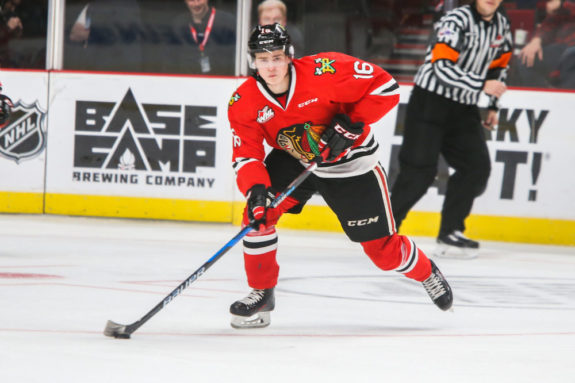
Henri Jokiharju of the Chicago Blackhawks — formerly of the WHL’s Portland Winterhawks — boasts the most NHL experience of any player in this year’s World Junior tournament, having suited up for 32 regular-season games prior to being loaned to Finland.
Sweden got blueliners Erik Brannstrom (Vegas) and Rasmus Sandin (Toronto) from the AHL and would have also got Timothy Liljegren (Toronto), who has since been ruled out with a high ankle sprain. Isac Lundestrom (Anaheim), a centre, joined the fold from the AHL’s San Diego Gulls.
Russia got forward Klim Kostin (St. Louis) and Switzerland will have lesser-known defender Tobias Geisser (Washington) from the AHL.
Last but definitely not least, the Czech Republic really loaded up with the addition of forwards Martin Necas (Carolina), Filip Zadina (Detroit) and Martin Kaut (Colorado), a trio of first-round picks developing in the AHL who could comprise the tournament’s top line if they wind up playing together. The Czechs didn’t get Filip Chytil (New York Rangers), but they will have plenty of firepower up front without him.
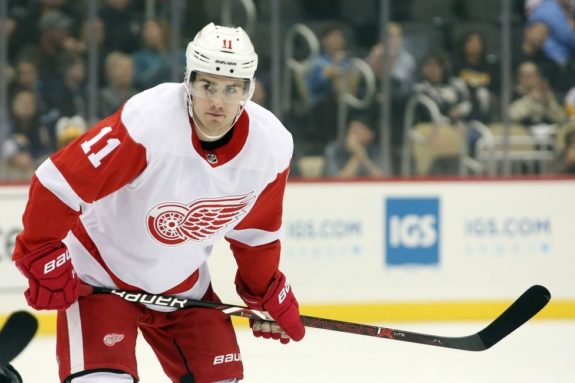
Filip Zadina, the sixth overall selection in 2018 for the Detroit Red Wings, has yet to make his NHL debut but has netted eight goals and 17 points through 27 AHL games for the Grand Rapids Griffins as a rookie pro.
6) Sweden’s Defence
Stacked, stacked, stacked. Led by Brannstrom, Sweden’s blue line might go down as one of the best ever assembled for the World Juniors.
This defence corps could feature four first-round picks, including Adam Boqvist (Chicago, eighth overall in 2018), Brannstrom (Vegas, 15th in 2017), Nils Lundkvist (New York Rangers, 28th in 2018) and Sandin (Toronto, 29th in 2018). Liljegren (Toronto, 17th in 2017) would have made it five, while Broberg, his potential replacement, is an A-rated prospect by NHL Central Scouting and another projected first-rounder for 2019.
Two other strong roster candidates, Filip Westerlund (Arizona, 44th in 2017) and Adam Ginning (Philadelphia, 50th in 2018), are both second-rounders, while Jakob Ragnarsson (New York Rangers, 70th in 2018) is a third-rounder.
That’s quite the group, top to bottom, and there’s a good chance that Sweden’s entire defence will be drafted in the top 50. That’s stacked!
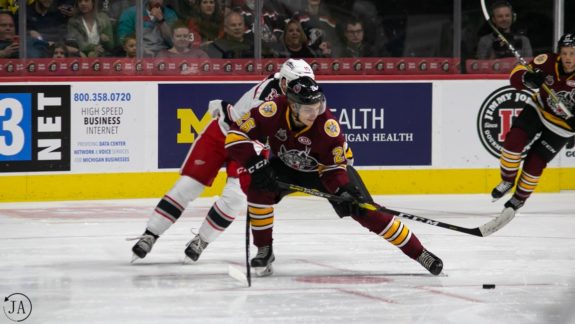
Erik Brannstrom has made a smooth transition to North America this season, producing 20 points (four goals, 16 assists) in 24 AHL games with the Chicago Wolves prior to being loaned to Sweden and getting the chance to captain his country in the World Juniors.
7) Finland’s Defence
Now led by Jokiharju and Vaakanainen, this defence group is primed for a coming-out party and should be all kinds of fun to watch.
Oskar Laaksonen was an off-the-radar third-round pick by Buffalo (89th in 2017) and he’s probably still foreign to casual hockey fans, but those in the know have been hyping him up ahead of this tournament. I’ve even heard comparisons to current Sabre Rasmus Ristolainen, so I’m prepared to be impressed and you shouldn’t be surprised if Laaksonen becomes one of this year’s breakout stars on the World Junior stage. He’s a sleeper prospect heading in, but some trusted sources have suggested Laaksonen would be a first-round candidate in a re-draft of 2017.
The aforementioned draft-eligible foursome of Kokkonen, Honka, Heinola and Thomson all have high ceilings as prototypical modern-day defencemen. I’ve had the pleasure of watching Thomson develop here in Kelowna, as a rookie import for the WHL’s Rockets, so I can confirm he’s going to be a good one down the road. He made an immediate impact at the major-junior level and has been a game-breaker on many nights.
.@lassithomson's got moves. 👀 pic.twitter.com/cURnuFZcBz
— Kelowna Rockets (@Kelowna_Rockets) October 28, 2018
Honka is the younger brother of Julius Honka in Dallas, while Kokkonen and Heinola have also been dazzling in the Liiga.
Vancouver fifth-rounder Toni Utunen isn’t as flashy as those six, but look for him to be a steady force for Finland as well.
Youth will be served for the Finns at this tournament and the future is certainly bright.
UPDATE: Finland got a late and surprising addition with the loan of Vaakanainen on Friday, which prompted the release of draft eligibles Thomson and Kokkonen, who will both likely be back for the 2020 tournament.
8) Czechs as Contenders
You heard it here first, this year is shaping up to be the Czech Republic’s best chance to win gold at the World Juniors for the first time since repeating in 2000 and 2001.
The Czechs are absolutely going to be in the medal mix. I’m confident in saying that. They are loaded at forward — led by Necas, Zadina and Kaut — and have three quality options in goal with Jakub Skarek (New York Islanders, 72nd in 2018), Lukas Dostal (Anaheim, 85th in 2018) and Jiri Patera (Vegas, 161st in 2017).
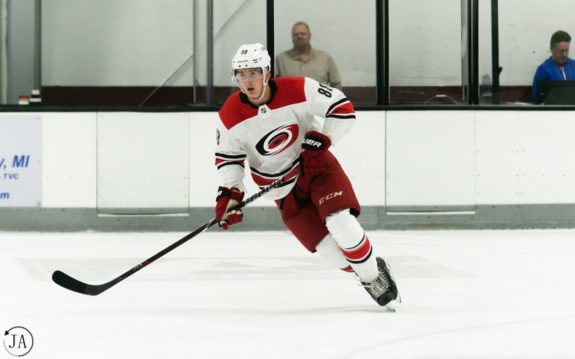
Martin Necas, the 12th overall pick from 2017 for the Carolina Hurricanes, has eight NHL games under his belt and was really heating up in the AHL — with 22 points (seven goals, 15 assists) in 26 games with the Charlotte Checkers — before departing to represent the Czech Republic at the World Junior Championship.
Their defence leaves a bit to be desired — compared to the other contenders, at least on paper — but the Czechs might be able to outscore the opposition in a run-and-gun style. In addition to those AHL ringers, look for Jakub Lauko and Matej Pekar to be the second wave of offence, along with undrafted Karel Plasek. Ostap Safin, an Oilers prospect, could have been a factor too, but he’ll miss the tournament due to injury.
All in all, the Czechs are looking potent coming in and shouldn’t be taken lightly. Don’t call them a sleeper team, just call them a contender from Day 1 in that Vancouver pool with Canada and Russia.
9) Switzerland Coach, Christian Wohlwend
This guy is a quote machine and a can’t-miss scrum. Wohlwend got off to a hot start in his WJC encore following Wednesday’s pre-tournament loss to Canada, telling the media throng in Victoria that Canada should beat Switzerland every time the two countries meet, then delivering this gem:
[miptheme_quote author=”” style=”text-center”]“But if you guys would come to a yodel competition, you guys would have no chance. No chance against us.”[/miptheme_quote]
Yodelling, I love it, and you can bet Wohlwend’s best is still to come. He’s going to get swarmed after the round-robin rematch with Canada on Day 2 of the tournament, next Thursday in Vancouver, so I’ll do my best to get within earshot of those golden sound nuggets.
I do hope Switzerland wins at least one game in this tournament, so we can look forward to seeing — and hearing — more of Wohlwend in the years to come.
In case you missed his performance last year in Buffalo, he’s a little refresher:
10) Medal Predictions & Tournament Awards
Here goes nothing, it’s time for my annual medal predictions — the part you’ve all been waiting for, but the part I’ve been dreading. Some years I look forward to sharing my predictions with varying degrees of confidence, but I honestly have no clue what’s going to happen in 2019.
I’ve bounced around several scenarios in my brain, which leads me to believe there are six medal contenders in this 10-team tournament. That’s not exactly a revelation, but it’s worth noting that any three of these six nations could land on the podium.
In Vancouver, we’ve got Canada, Russia and the Czech Republic. In Victoria, there’s Sweden, Finland and the United States. No disrespect to Switzerland, Slovakia, Denmark and Kazakhstan, but those four seem destined to be also-rans.
You can’t discount Canada, the defending champ on home ice, and the Americans shouldn’t be dismissed either. You never know what to expect from Russia, but there’s a lot of high-end talent on that roster too — with or without Podkolzin.
However, I feel like Finland has as good a shot at gold as anyone and Sweden is almost a lock to play in a medal game again. As mentioned, I’m high on the Czech Republic as well. So how does it shake down, you ask?
Hmm, I’m still not sure — not sure by any stretch of the imagination and I’d dodge the question if I could — but, when in doubt, I’m going to go with the safe pick, the homer pick in taking Canada over Finland for gold. I’ll go bolder for bronze, taking the Czech Republic to beat Sweden in the third-place game.
That would mean Russia and the United States both fall short of the semifinals, losing out in their crossover quarters, but I could just as easily envision the Russians and Americans facing off for gold. It’s one of those years, but I have Canada winning gold, Finland settling for silver, and the Czechs claiming bronze.
As for my tournament awards, based on my medal predictions, I’ll go with surefire Canadian captain Comtois as the Most Valuable Player, Zadina as the Top Forward, Brannstrom as the Top Defenceman, and Finland’s Ukko-Pekka Luukkonen as the Top Goaltender. Now let me ask, who do you got?